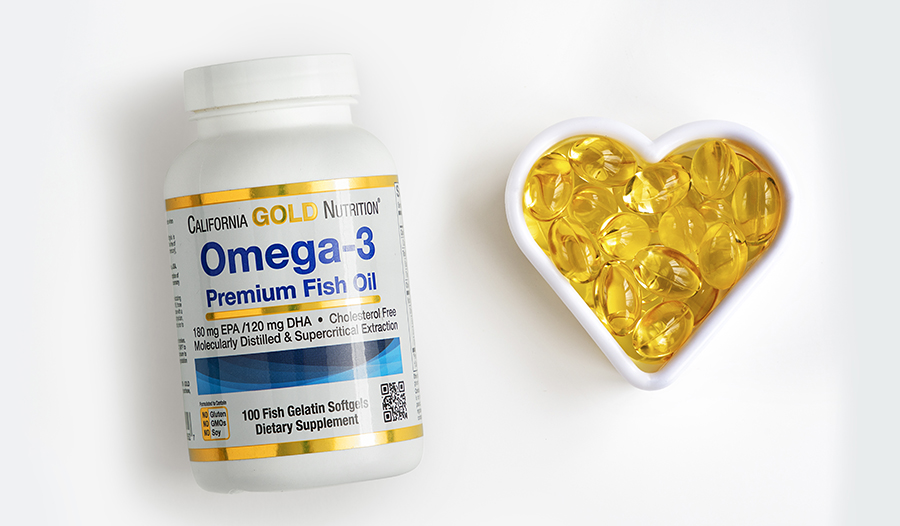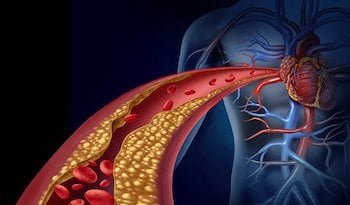Τι λέει η έρευνα για τα ωμέγα-3 λιπαρά οξέα και την υγεία της καρδιάς σας;

Τι είναι τα ωμέγα-3 λιπαρά οξέα;
Τα ωμέγα-3 λιπαρά οξέα βρίσκονται στα ψάρια και σε πολλά άλλα είδη διατροφής. Εκτός από το ότι είναι χρήσιμο για όσους πάσχουν από αρθρίτιδα, υψηλά τριγλυκερικά και υψηλή αρτηριακή πίεση, πολλοί πιστεύουν ότι τα ωμέγα-3 λιπαρά οξέα μπορεί επίσης να έχουν ως αποτέλεσμα την πρόληψη των περιστατικών παθήσεων.
Τα ωμέγα-3 λιπαρά οξέα αποτελούνται κυρίως από DHA, EPA και ALA.
- Το δοκοσαεξονικό αέριο (DHA) είναι ένα ωμέγα-3 λιπαρό αέριο που αποτελεί το πρωταρχικό συστατικό του ανθρώπινου μυός, του σώματος και των ματιών. Αν και είναι σημαντικό, δεν θεωρείται «απαραίτητο», καθώς μπορεί να παραχθεί στο σώμα επειδή το α-λινολενικό οξύ (ALA) καταναλώνεται στη διατροφή.
- Το εικοσαπεντανοϊκό οξύ (EPA ή εικονοαπεντανοϊκό οξύ) βρίσκεται συνήθως στο ιχθυέλαιο, στο κριλ, και στα άτομα (υποθέτοντας ότι τα φυτά τρέφονται με EPA).
- Άλφα-λινολενικό οξύ (ALA, ένα ωμέγα 3 λιπαρό οξύ), το οποίο μπορεί να βρεθεί σε λιναρόσπορο, για την κατανάλωση, συζύγων από αυτά, και άτομα με κάνναβη. Η κατανάλωση αυτών των τροφών στη διατροφή του ασθενούς είναι ζωτικής σημασίας για να βοηθήσει στην παραγωγή DHA.
Είναι κοινή η ανεπάρκεια ωμέγαα-3;
Το 90% των Αμερικανών, και πολλοί άλλοι σε όλο τον κόσμο, δεν ανταποκρίνονται στη σύσταση της Αμερικανικής Καρδιολογικής Εταιρείας για δύο μερίδια των 3,5 ουγγιών (100 γραμμάρια/μερίδα) το λεπτό, από ψάρια χαμηλής πυκνότητας σε υδράργυρο. Μια προκαθορισμένη διατροφή είναι ένας πολύ καλός τρόπος για να διασφαλίσετε ότι καταναλώνετε επαρκή απαραίτητα θρεπτικά συστατικά οξέος και άλλα υγρά και μέταλλα.
Ποιες είναι οι πηγές τροφίμων του Ωμέγαα-3;
Τα οξέα λιπαρά μπορούν να βρεθούν σε διάφορες πηγές τροφίμων. Αυτό περιλαμβάνει τα αντίστοιχα ψάρια: γαύρος, ιππόγλωσση, στρείδια, χαβιάρια, σκουμπρί, μπακαλιάρος και σολοθία. Η κατανάλωση δύο μερίδων ψαριών κάθε εβδομάδα θα σας προσφέρει περίπου 1.750 mg EPA/DHA. Τα οξέα οξέων βρίσκονται επίσης στα γεύματα, είδη κολοκύθας, είδη chia, λίθου, είδη κάνναβης, ξηρών καρπών, και συναίσθημα.
Τι δείχνουν τα τελευταία περιστατικά για τα ωμέγαα-3 και τις κρίσιμες παθήσεις;
Οι κρίσιμες παθήσεις σκοτώνουν εκατοντάδες ανθρώπους παγκοσμίως. Η σύγχρονη ιατρική επικεντρώνεται στη μείωση των παραγόντων της καρδιάς, όπως η υψηλή αρτηριακή πίεση, η χοληστερόλη και ο διαβήτης, με την ελπίδα να μειωθούν οι επιπλοκές από τις περιστατικές παθήσεις. Τα ωμέγα-3 λιπαρά οξέα μπορούν επίσης να συμβάλλουν στη διατήρηση της υγείας της καρδιάς σας.
Μια μελέτη του 2013 στην επιθεώρηση Annals of Internal Medicine περιελάμβανε 2.692 επιδόσεις των ασθενών ηλικίας 69 έως 79 ετών χωρίς ιστορικό εγκεφαλικού επεισοδίου, εγκεφαλικού επεισοδίου ή συμπτωματικού επεισοδίου. Τα επίπεδα των λιπαρών οξέων στη θέση των ανδρών μετρήθηκαν το 1992. Πραγματοποιήθηκαν μέχρι το 2008. Οι ερευνητές έδειξαν ότι τα άτομα με υψηλότερα επίπεδα EPA και DHA είχαν 17% και 23% λιγότερες πιθανότητες να υπερκαταναλώσουν. Οι ερευνητές κατέληξαν στο συμπέρασμα ότι τα υψηλότερα επίπεδα των λιπαρών οξέων με 3 πολυακόρεστες ολικές ουσίες σχετίζονται με χαμηλότερο κίνδυνο θανάτου από καρδιαγγειακά νοσήματα.
Σε μια μελέτη του 2012 σε άτομα που είχαν υποστεί καρδιακή προσβολή, οι ερευνητές κατέληξαν στο συμπέρασμα ότι η κατανάλωση ωμέγα-3 οξέων οξέων (EPA και DHA) είχαν 45% λιγότερες πιθανότητες να πεθάνουν από το ίδιο σοβαρό κίνδυνο, 20% είχαν μειώσεις των καρδιαγγειακών παθήσεων και 15% λιγότερες πιθανότητες να πεθάνουν από οποιαδήποτε περίπτωση.
Περαιτέρω, μια μελέτη του 2017 σχετικά με την αθηροσκλήρωση έδειξε ότι τα υψηλότερα επίπεδα ωμέγα-3 λιπαρών οξέων σε ένα άτομο θα μπορούσαν να μειώσουν κατά 30 τοις εκατό τη σοβαρότητα από παθήσεις κινδύνου, τον κύριο παράγοντα των ανθρώπων παγκοσμίως. Αυτό και μόνο θα μπορούσε να σώσει εκατομμύρια ζωές κάθε χρόνο.
Τέλος, μια μελέτη μετα-μεθόδων του 2021 στο Mayo Clinic Proceedings αξιολόγησε τις βελτιώσεις του συμπληρώματος EPA/DHA σε πειραματόζωα. Συγκεκριμένα, οι ερευνητές συμπεριέλαβαν 40 επιστημονικές μελέτες στην ανάληψη τους. Συμπεριφορά σε 135.267 άτομα, γεγονός που δίνει μεγάλη απόδοση στη μελέτη. Τα αποτελέσματα έδειξαν ότι η συμπλήρωση σχετίζεται με τα σημαντικά οφέλη από τη συμπλήρωση:
- 10% μείωση της στεφανιαίας νόσου (CHD)
- 13% μείωση των μη θανατηφόρων περιστατικών προσβολών (ΜΙ)
- 35% μείωση των θανατηφόρων περιστατικών προσβολών
- Δεν υπήρξε καμία επίδραση στη στηθάγχη, τα εγκεφαλικά επεισόδια, την καρδιακή ανεπάρκεια και την περιφερική αρτηριακή νόσο
Οι ερευνητές κατέληξαν στο συμπέρασμα ότι η συνδυασμένη χορήγηση EPA και DHA (ωμέγα-3 οξέων οξέων οξέων) είναι μια αποτελεσματική στρατηγική διέλευσης της ζωής για την εξέταση των περιστατικών παθήσεων. Επίσης, ανέφεραν ότι η προστατευτική επίδραση πιθανότατα αυξάνεται με τη δοσολογία των ωμέγα-3 λιπαρών οξέων.
Ωμέγα-3 και υψηλά τριγλυκαντικά
Τα υψηλά τριγλυκερικά, ή τα λίπη των ζωοτροφών στο δοχείο, είναι γνωστός παράγοντας για περιστατικές παθήσεις. Τα τριγλυκά αναφέρονται συνήθως όταν ο γιατρός παραθέτει μια ολοκληρωμένη εξέταση σχετικά με τη χοληστερόλη. Τα άτομα με αντίσταση στην ινσουλίνη, προδιαβήτη ή διαβήτη διατρέχουν αυξημένο κίνδυνο να έχουν αυξημένα τριγλυκά. Επίσης, όσοι είναι υπέρβαροι ή τρώνε πολλά επεξεργασμένα τρόφιμα έχουν περισσότερες πιθανότητες να έχουν αυξημένα επίπεδα τριγλυκερικών κατά τη μέτρηση. Ως εκ τούτου, η μείωση των επιπέδων τριγλυκερικών ουσιών στο πακέτο είναι ζωτικής σημασίας για τη διατήρηση της υγείας της. Ενώ η διατροφή και η τακτική άσκηση μπορούν να διαδραματίσουν σημαντικό ρόλο, τα συμπληρώματα μπορούν επίσης να είναι χρήσιμα.
Για παράδειγμα, μια μελέτη του 2016 στο Lipids in Health and Disease κατέληξε στο συμπέρασμα ότι τα ωμέγα-3 λιπαρά οξέα είναι χρήσιμα στη μείωση των τριγλυκικών. Το βλέπουν αυτό και στη δική μου πρακτική. Συνήθως συστήνω συμπληρώματα ιχθύων σε ασθενείς με αυξημένα τριγλυκερικά. Τα τελευταία 15 χρόνια, βλέπουμε εξαιρετικά αποτελέσματα. Σε περισσότερες περιπτώσεις, μπορούμε να αποφύγουμε τα συνταγογραφούμενα φάρμακα. Όλο και περισσότεροι γιατροί βασίζονται στο ωμέγα-3 έλαιο ιχθυού για να βοηθήσουν στη μείωση των τριγλυκικών ουσιών που σχετίζονται με τα φαρμακευτικά προϊόντα.
Επιπλέον, μια μελέτη μετα-θεραπείας του 2017 στην περιοδική αθηροσκλήρωση, η οποία αφορούσε 1378 άτομα, έδειξε επίσης ότι η κατανάλωση λιπαρών τροφών συνέβαλε στη μείωση των τριγλυκερικών ουσιών, ενώ παρουσίασε τα επίπεδα της HDL (καλή χοληστερόλη), δύο σημαντικές βιοδείκες για καρδιαγγειακές παθήσεις.
Οι μεγάλοι άνθρωποι χρειάζονται περίπου 4.000 mg ιχθύων καθημερινά για να βοηθήσουν στη μείωση των επιπέδων των τριγλυκερικών τους. Για ορισμένους, το κριτήριο του φαρμάκου μπορεί επίσης να είναι μια κατάλληλη εναλλακτική λύση.
Ωμέγα-3 και αρτηριακή πίεση
Η υψηλή αρτηριακή πίεση, επίσης γνωστή ως υπέρταση, είναι μια κοινή κατάσταση που απαιτεί από την καρδιά να ανταλλάσσεται περισσότερο από το επιθυμητό λόγω της αυξημένης πίεσης και της δυσσκαμψίας στις αρτηρίες. Η υψηλή αρτηριακή πίεση επηρεάζει τη μείωση των εκατοντάδων ανθρώπων παγκοσμίως.
Αυτή η κατάσταση συχνά δεν προκαλεί συμπτώματα, αφήνοντας πολλούς ανθρώπους με υψηλή αρτηριακή πίεση αδιαμφισβήτητα για χρόνια. Για το λόγο αυτό, η υπέρταση έχει ονομαστεί «ο σιωπηλός δολοφόνος». Η υψηλή αρτηριακή πίεση είναι γνωστό ότι αυξάνει τον κίνδυνο προσβολής κρίσης, εγκεφαλικού επεισοδίου, επείγουσας κρίσης και νεφροπάθειας, ιδίως αν δεν αντιμετωπιστεί.
Οι μετρήσεις της αρτηριακής πίεσης αποτελούνται από δύο αριθμούς, οι παραδοσιακοί αριθμοί μετριούνται σε χιλιοστά υδραργύρου (mmHg). Ο γνωστός αριθμός είναι η συστολική αρτηριακή πίεση και ο δεύτερος η διαστολική πίεση. Η αρτηριακή πίεση εκφράζεται ως 120/80 (συστολική-διαστολική).
- Συστολική αρτηριακή πίεση: η πίεση που ασκεί την καρδιά σας στις αρτηρίες σας κατά την άσκηση.
- Διαστολική αρτηριακή πίεση: η πίεση στις αρτηρίες όταν η καρδιά βρίσκεται σε ηρεμία.
Οι περισσότεροι γιατροί υποστηρίζουν ότι μια μέτρηση της αρτηριακής πίεσης πάνω από 140/90 είναι εύχρηστη και ενδέχεται να απαιτεί θεραπεία.
Τι προκαλεί υπέρταση;
Υπάρχουν πολλές επιπτώσεις της υπέρτασης, όπως η έλλειψη σωματικής διαταραχής, η κακή διατροφή, το υπερβολικό βάρος, η παχυσαρκία, η αντίσταση στην ινσουλίνη, ο προδιαβήτης, ο διαβήτης, η νεφρική νόσος ή ενδεχομένως ακόμη και η γενετική. Επιπλέον, η υψηλή αρτηριακή πίεση μπορεί επίσης να εμφανιστεί ως συνέπεια της ενυδάτωσης.
Τα καλά νέα είναι ότι τα απαραίτητα λιπαρά οξέα μπορούν να βοηθήσουν. Μια τυχαία ελεγχόμενη δοκιμή του 2009 που δημοσιεύθηκε στο Journal of Hypertension έδειξε ότι τα συμπληρώματα ωμέγα-3 λιπαρών οξέων θα μπορούσαν να βοηθήσουν στη μείωση της αρτηριακής πίεσης όταν λαμβάνονται σε δόση 4 γραμμαρίων (4.000 mg) ημερησίως.
Επιπλέον, μια μελέτη του 2014 στο American Journal of Hypertension έδειξε ότι το DHA/EPA μείωσε τη συστολική αρτηριακή πίεση και όταν η πρόσληψη ήταν μεγαλύτερη από 2 γραμμάρια (2.000 mg) ημερησίως, μειώθηκε επίσης η διασταλτική αρτηριακή πίεση (ο μεγαλύτερος αριθμός). Συγκεκριμένα, 70 επιτυχώς ελεγμένες μελέτες αξιολογήθηκαν σε αυτήν την ολοκληρωμένη μελέτη. Επίσης, μια μελέτη του 2016 στην επιθεώρηση Journal of Nutrition έδειξε ότι η κατανάλωση ιχθύων σε δόση μόλις 700 mg ημερησίως θα μπορούσε να συμβάλει στη σημαντική μείωση της αρτηριακής πίεσης.
Πιο πρόσφατα, μια μελέτη του 2018 έδειξε 2.036 υγιείς ενήλικες ηλικίας 25 έως 41 ετών. Οι ερευνητές κατέληξαν στο συμπέρασμα ότι όσοι είχαν υψηλότερα επίπεδα ωμέγα-3 είχαν χαμηλότερη αρτηριακή πίεση σε σύγκριση με όσους είχαν τα χαμηλότερα επίπεδα. Οι ερευνητές διαπίστωσαν επίσης ότι οι δίαιτες με υψηλή περιεκτικότητα σε ωμέγα-3 λιπαρά οξέα θα μπορούσαν να αποτελέσουν μια χρήσιμη στρατηγική για τον έλεγχο της ανάπτυξης υψηλής αρτηριακής πίεσης.
Παρά τα προαναφερθέντα στοιχεία, μια μικρή μελέτη του 2019 διαπίστωσε ότι τα διαιτητικά ωμέγα-3 λιπαρά οξέα δεν είχαν καμία επίδραση στην υψηλή αρτηριακή πίεση. Φυσικά, δεν υπάρχουν ενδείξεις για οποιαδήποτε βλάβη. Προσωπικά, έχω δει ευεργετικά αποτελέσματα στη δική μου κλινική ιατρική.
Ωμέγα-3 Συστάσεις
Οι ενήλικες που παίρνουν συμπλήρωμα λαμβάνουν από 500 mg έως 4.000 mg ιχθυελαίου την ημέρα. Εάν λαμβάνετε την αντίστοιχη δόση, μπορεί να εξεταστεί ενδεχομένως να λαμβάνετε τη μισή δόση το πρωί και το λιγότερο το βάρδος. Υπάρχουν επίσης διαθέσιμες vegan επιλογές λιπαρών οξέων EPA/DHA. Τα ωμέγα-3 λιπαρά οξέα διατίθενται σε κάψουλες, υγρά και σκευάσματα σε μορφή καραμέλας. Επίσης, είναι σημαντικό να σημειωθεί ότι το έλαιο Krill μπορεί επίσης να είναι μια κατάλληλη εναλλακτική λύση για όσους δεν περιέχουν τα συμπληρώματα ιχθύων.
Αναφορές:
- Πρόσβαση στις 11 Φεβρουαρίου 2019 https://www.heart.org/en/healthy-living/healthy-eating/eat-smart/fats/fish-and-omega-3-fatty-acids
- Μοζαφαριάν Δ, Λεμαϊτρέ ΡΝ, Βασιλιάς ΙΒ, Σονγκ Χ, Χουάνγκ Χ, Σακς ΦΜ, κ.α. Η μακροχρόνια παρουσία ω-3 οξέων φωσφολιπιδίων οξέων και συνολικών και ειδικών για την εμφάνιση της ευαισθησίας σε ηλικιωμένους: Σχεδιασμός της κορονοποίησης. Ανν Εσωτερική Ιατρική 2013; 158:515-525.
- Dalal JJ, Kasliwal RR, Dutta AL, Sawhney JP, Iyengar SS, Dani S, Desai N, Sathyamurthy I, Rao D, Menon A, Dasbiswas A, Wander GS, Chadha M, Hiremath MS, DG Roy, Gupta V, Shivakadaksham N Ο ρόλος του συμπυκνώματος ωμέγα-3 αιθυλεστέρα στη μείωση του αιφνίδιου καρδιακού θανάτου μετά από αιφνίδιο καρδιακό θάνατο έμφραγμα του μυοκαρδίου και στη διαχείριση της υπερτριγλυκεριδαιμίας: μια ινδική δήλωση συναίνεσης. Ινδική καρδιά J. 2012 Σεπτέμβριος-Οκτώβριος 64 (5): 503-7.
- Αθροσκλήρωση. 2017 Ιούλιος; 262:51-54. doi: 10.1016/j.αθηροσκλήρωση.2017.05.007. Epub 2017 6 Μαΐου.
- Μπερνασκονί ΑΑ, Γουίστ ΜΜ, Λάβι Σι Τζέι, Μιλάνι ΡΒ, Λάκκανεν Γ.Α. Επίδραση της δοσολογίας ωμέγα-3 στα καρδιαγγειακά αποτελέσματα: Μετα-ανάλυση και μετα-παλινική θεραπεία παρεμβατικών δοκιμών. Διαδικασία Mayo Clin 2021 Φεβρουάριος 96 (2): 304-313.
- Υγεία λιπιδίων Δεκέμβριος 2016 22 Ιουλίου 15 (1): 118. doi: 10.1186/s12944-016-0286-4.
- Αθροσκλήρωση. 2017 Νοέμβριος; 266:87-94. doi:10.1016/j.αθηροσκλήρωση.2017.09.028. Epub 2017 28 Σεπτεμβρίου.
- Τζέι Υπερτένς. 2009 Σεπ. 27 (9) :1863-72
- Μίλερ ΠΕ, Βαν Έλσουικ Μ, Αλέξανδρος DD. Η μακρά αλύση των ωμέγα-3 οξέων οξέων οξέων οξέων και δοκοσαεξανοϊκών κυττάρων και αρτηριακής πίεσης: μετα-ανάλυση που ελέγχεται τυχαία από τους μελετητές. Είμαι Τζέι Υπερτένς. 2014; 27 (7): 885-896.
- Νοτρ. 2016 Μάρτιος; 146 (3): 516-23. doi: 10.3945/jn.115.220475. Epub 2016 27 Ιανουαρίου.
- Φιλίποβιτς Μ.Γ., Αέσμπαχερ Σ, Ράινερ ΜΦ, Στιβάλα Σ, Γκομπάτο Σ, Μπονέτι Ν, Ρις Μ, Ρις Λ, Καμισί ΓΓ, Λούσερ Τ.Φ., φον Σάκυ Γ, Κόνεν Δ, Μπερ Τζι. Οι συγκεντρώσεις ωα-3 λιπαρών οξέων στο ολικό θα μπορούσαν να συνδέσουν το αντιστρεφόμενο φως ανάλογα με την αρτηριακή πίεση σε νέες, υγιείς επιδράσεις. Τζέι Υπερτένς. 2018 Ιούλιος; 36 (7): 1548-1554.
- Ματσουμότο Γ, Γιόρουκ Α, Γουάνγκ Λ, Γκαζιάνο ΤζΜ, Σεξ HD. Η κατανάλωση ψαριών και ωμέγα-3 λιπαρών οξέων και κίνδυνος υπέρτασης. Τζέι Υπερτένς. 2019 Ιούνιος. 37 (6): 1223-1229.
ΑΠΟΠΟΙΗΣΗ ΕΥΘΥΝΗΣ:Αυτό το Κέντρο Ευεξίας δεν προορίζεται να παρέχει διάγνωση...
















































































 Πίνακας περιεχομένων
Πίνακας περιεχομένων













